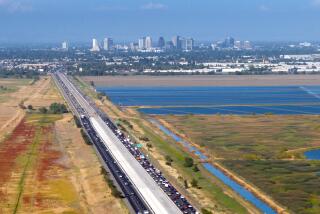Revised Private-Bus Plan Still Criticized
- Share via
El MONTE — A plan to turn over RTD bus service in the San Gabriel Valley to low-cost private operators resurfaced last week after months of revision and was harshly criticized by union leaders, who said it would result in large-scale layoffs and unreliable service.
The revised plan was presented at a public hearing--the last in a series of hearings before the Los Angeles County Transportation Commission makes a final decision on the proposal later this month.
Engineers were forced to change the plan after it was rejected by Pasadena, La Puente and San Gabriel. The proposed transit zone to be served by the private buses was restructured so that it includes only five routes in Pasadena instead of the original 12.
Two Routes Disputed
However, Pasadena also criticized the revised proposal because the five bus routes that would be turned over to a private company include two of the city’s busiest.
The disputed routes are the Southern California Rapid Transit District’s 187, along Colorado Boulevard, and the 264, which starts in Altadena and travels down Altadena Drive and San Gabriel Boulevard.
Nancy Leon, chairman of Pasadena’s Transportation Commission, said the city objects to having the two heavily traveled lines turned over to an agency it would not control.
“It just runs contrary to our decision not to participate,” she said.
The loudest attacks came from union bus drivers and mechanics who have fought the proposal since it was first presented to cities in the San Gabriel Valley in January.
Earl Clark, general chairman of the United Transportation Union, which represents 5,500 RTD drivers, said turning over bus service to lower-paying private companies would invite maintenance and service problems.
Layoffs Predicted
He added that despite assurances from supporters of the proposal, RTD employees would face layoffs or reassignment to areas far from their homes.
“The negative impact this would have on our members’ lives is more than ample reason to reject the proposal,” Clark said.
Supporters of the plan, including representatives from the Southern California Assn. of Cities, private bus companies and the federal government, hailed it as an innovative way to improve bus service in the 350-square-mile San Gabriel Valley.
William P. Forsythe, a county consultant hired to prepare the plan, said it could reduce the cost of bus service in the area by as much as $12 million a year.
Those savings would be used to lower fares and increase service in the San Gabriel Valley, Forsythe said.
He added that bids to provide bus service in a pilot project in the east San Gabriel Valley have come in 40% to 60% below what RTD spends to provide the same service.
“We really believe that the people of this valley will be very well served,” said Keith Curry of the U.S. Urban Mass Transportation Administration. “About $80 million of bus service has been contracted out around the country in the last year and a half without the horror stories that have been alluded to.”
The plan to create an independent San Gabriel Valley Transportation Zone is based on state legislation that allows the county Transportation Commission to set up an independent transportation zone if service from an existing operator is deemed inadequate, unresponsive or too costly.
County Supervisor Pete Schabarum, who first proposed the idea in 1984, has maintained that RTD fails on all three counts.
Under the plan, 19 of 56 RTD bus lines would be turned over to private companies, which would bid competitively for the routes.
The private companies would purchase, maintain and operate their own buses. The companies would be under the control of a council made up of representatives from the county and the 26 cities that have voted to join the zone.
RTD would continue to run the remaining routes, maintain all bus stops, provide route information and distribute bus schedules.
Forsythe said competitive bidding and lower overhead because of the relatively small size of the transportation zone would reduce the cost of operating those lines from the $37 million a year now spent by RTD to $25 million--a 32% saving.
He said riders would not notice the change in operators because the zone would have the same fares, type of buses and routes that RTD now has.
Forsythe said the proposal would not result in layoffs of any current RTD employees because it would be phased in slowly from March, 1988, to January, 1989. Normal attrition over that period, he said, would equal the number of jobs that might be lost because of the new system.
But the union’s Clark said Forsythe’s claim was an “absolute falsehood.” He argued that there is very little turnover of workers in the San Gabriel Valley and that many workers would be laid off or reassigned.
He said RTD has proposed closing its Pomona division, which would result in the loss of 160 jobs.
Clark has long maintained that private bus companies cannot provide quality service because they traditionally pay less, have a higher turnover rate and employ less- experienced workers.
But James Seal, a consultant to the California Bus Assn., said the majority of private bus companies are unionized and provide the same level of service as RTD.
More to Read
Sign up for Essential California
The most important California stories and recommendations in your inbox every morning.
You may occasionally receive promotional content from the Los Angeles Times.














